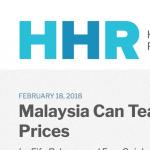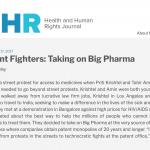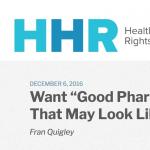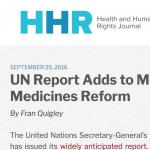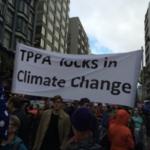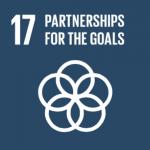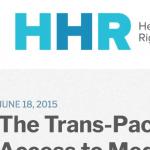This article was co-authored by Fifa Rahman and PFAM coordinator Fran Quigley and was originally published in the Health and Human Rights Journal on February 18, 2018. To read the article at its original source, and with references hyperlinked, click here.
This article by PFAM coordinator Fran Quigley was published in the Health and Human Rights Journal. To see the article at its original source, with reference sources hyperlinked, click here.
In her final address to the World Health Assembly as Director-General of the WHO, Dr. Margaret Chan identified access to medicines as the most contentious issue of her decade-long tenure. That struggle was engaged, she said, “especially when intellectual property and the patent system were perceived as barriers to both affordable prices and the development of new products for diseases of the poor.”
At first glance, it seems that clinical trials are the much-criticized pharmaceutical industry’s best contribution to the medicines process. The industry leans on governments to fund early-stage research, then claims the patent rights to the most promising fruits of that research.
In the interview that accompanied President-elect Donald Trump’s Time magazine Person of the Year story, he said, “I’m going to bring down drug prices. I don’t like what has happened with drug prices.”
If you don’t find yourself agreeing with Trump very often, you may have finally found common ground. As the man said, there is a lot not to like.
The long list of complaints about the current system of medicine access and pharmacological research is well-known and well-documented, including in the Health and Human Rights Journal.
Those complaints start with patients facing significant—often deadly—pricing barriers, in low-income and high-income countries alike. The pharmaceutical companies that set those prices have been fiercely criticized for benefitting from publicly-funded research and then leveraging resulting patent monopolies to achieve profit margins that are the envy of other industries.
Price-gouging anger about drugs like the EpiPen, plus a promising California ballot initiative, and now a strong UN report on access to medicines. Will it all lead to reform of our broken medicines system?
Full disclosure: initially, I was not very excited about the announcement of the convening of the United Nations Secretary-General’s High-Level Panel on Access to Medicines. Every human rights advocate has learned to approach with restraint the news of yet another august group convening to review a crisis.
Such groups can be counted on to issue a wonderful report with promising language. But, almost inevitably, the gauzy, aspirational recommendations in that report are promptly ignored. Worse, in the case of access to medicines, noble but unenforceable calls for reform are reliably bulldozed over by binding trade agreements that elevate corporate profits over human rights.
The flaws of the modern medicine patent system are widely decried. The current system fails to develop medicines to address the health needs of the global poor and creates a platform for unaffordable pricing of the medicines that exist. But even the harshest critics of the patent paradigm recognize the need to provide incentives for vigorous research and development of new medicines. Many alternatives have been proposed. Some are already in operation at limited levels. But these alternatives are poorly understood, even in the global health community.
Earlier this month, representatives of the Trans-Pacific Partnership Agreement (TPPA) parties announced they had concluded five years of negotiations by agreeing to final terms. The governments have not yet allowed the public to view the agreement, but a version of the TPPA’s intellectual property chapter published by Wikileaks reveals what I consider a potentially devastating setback to the human right to health.
Part of my job is to work alongside my law students as we represent low-income persons in our Indianapolis-based clinic. Our community does not have a strong public transit system, and many of the available jobs are located far away from where our clients live. Our clients need cars, but they do not have much cash or strong credit ratings. So they turn to the car dealers that populate their neighborhoods, filling concrete lots with shiny vehicles and bright signs promising great cars and forgiving financial terms.
Representatives of Pacific Rim nations are negotiating a trade agreement that could negatively impact the health of millions. But the high-profile discussion about the proposed Trans-Pacific Partnership Agreement (TPPA) also presents an opportunity for health advocates. This Perspective essay first reviews key proposed terms of the TPPA that would extend the flawed pharmaceutical patent regime and violate multiple human rights commitments. Second, the social movement to ensure access to antiretroviral medicines is presented as an object lesson in successful advocacy for health as a human right. Finally, this essay argues that the attention paid to the TPPA by media, lawmakers, and social justice activists, particularly in the US, creates an ideal platform for advocacy in support of the human right to essential medicines.

